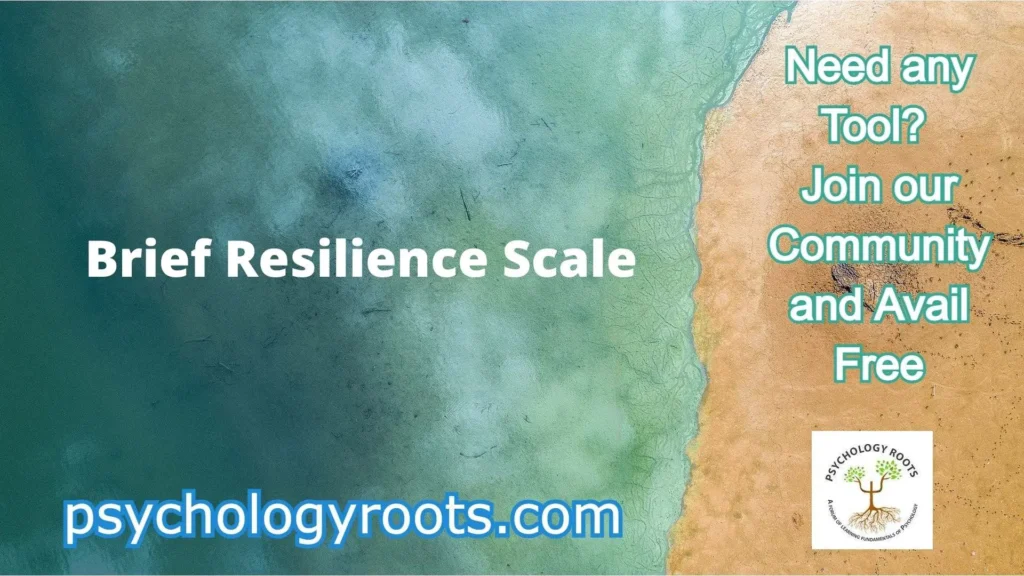Table of Contents
Brief Resilience Scale
Here in this post, we are sharing the “Brief Resilience Scale”. You can read psychometric and Author information. We have thousands of Scales and questionnaires in our collection (See Scales and Questionnaires). You can demand us any scale and questionnaires related to psychology through our community, and we will provide you with a short time. Keep visiting Psychology Roots.
About Brief Resilience Scale
Scale Name
Brief Resilience Scale
Author Details
Bruce W. Smith (Department of Psychology, University of New Mexico)
bwsmith@unm.edu
Translation Availability

Background/Description
The Brief Resilience Scale (BRS) was created to measure an individual’s ability to recover from stress, also known as resilience. Resilience is a crucial psychological trait that helps people cope with adversity and bounce back from difficult situations. Traditional measures of resilience often included broader aspects such as coping strategies and social support, but the BRS focuses specifically on the ability to recover from stress. This six-item scale provides a concise and efficient means of assessing resilience, making it a popular choice in both clinical and research settings. T
he development of the BRS was motivated by the need for a straightforward tool that could be used across various populations to assess resilience without the influence of other factors like social desirability or specific coping styles.
Administration, Scoring and Interpretation
- Distribution: The BRS can be administered either on paper or electronically.
- Instructions: Participants are instructed to respond to six items, rating their agreement on a Likert scale from 1 (strongly disagree) to 5 (strongly agree).
- Items: The six items include three positively worded statements (e.g., “I tend to bounce back quickly after hard times”) and three negatively worded statements (e.g., “It is hard for me to snap back when something bad happens”).
- Scoring: Responses to the negatively worded items are reverse-coded. The scores for all six items are then averaged to produce a single resilience score.
Reliability and Validity
The BRS has demonstrated good reliability and validity across various studies and populations. The internal consistency of the scale is high, with Cronbach’s alpha coefficients typically exceeding 0.80. Test-retest reliability over periods ranging from a few weeks to several months has also been shown to be robust. Validity studies indicate that the BRS correlates appropriately with other measures of resilience, as well as with related constructs such as optimism, social support, and psychological well-being. The scale’s ability to predict outcomes related to stress recovery and mental health further supports its validity.
Available Versions
06-Items
Reference
Smith, B. W., Dalen, J., Wiggins, K., Tooley, E., Christopher, P., & Bernard, J. (2008). The brief resilience scale: assessing the ability to bounce back. International journal of behavioral medicine, 15, 194-200.
Important Link
Scale File:
Frequently Asked Questions
Q1: What is the Brief Resilience Scale?
A1: The Brief Resilience Scale (BRS) is a six-item scale designed to measure an individual’s ability to recover from stress.
Q2: Who developed the BRS?
A2: The BRS was developed by Bruce W. Smith and his colleagues in 2008.
Q3: How is the BRS scored?
A3: The BRS is scored by reverse coding the negatively worded items and then averaging the responses to all six items.
Q4: What does a higher score on the BRS indicate?
A4: A higher score on the BRS indicates a greater ability to bounce back from stress, reflecting higher resilience.
Disclaimer
Please note that Psychology Roots does not have the right to grant permission for the use of any psychological scales or assessments listed on its website. To use any scale or assessment, you must obtain permission directly from the author or translator of the tool. Psychology Roots provides information about various tools and their administration procedures, but it is your responsibility to obtain proper permissions before using any scale or assessment. If you need further information about an author’s contact details, please submit a query to the Psychology Roots team.
Help Us Improve This Article
Have you discovered an inaccuracy? We put out great effort to give accurate and scientifically trustworthy information to our readers. Please notify us if you discover any typographical or grammatical errors.
Make a comment. We acknowledge and appreciate your efforts.
Share With Us
If you have any scale or any material related to psychology kindly share it with us at psychologyroots@gmail.com. We help others on behalf of you.